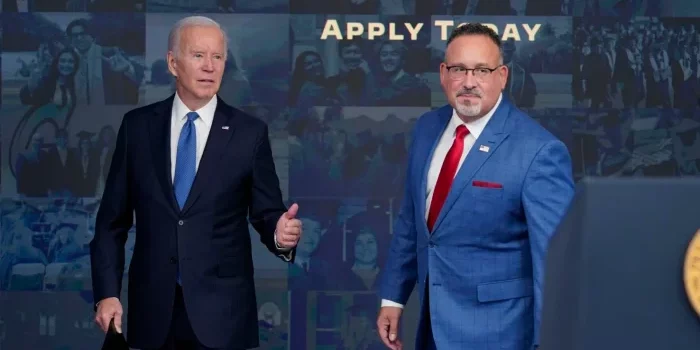The White House announced Wednesday another round of legally dubious student-loan amnesty as those who avoided paying their loans throughout the pandemic find themselves once again obligated to resume the monthly payments.
The disclosure comes months after the U.S. Supreme Court blocked a broader effort by President Joe Biden to transfer hundreds of billions of dollars in student-loan debts onto the general taxpaying public, many of whom already paid their off or never took out loans in the first place.
Despite the failure of that effort, which the court ruled unconstitutional, saying it would require an act of Congress and that the executive branch alone lacked the authority, the Democrat regime has vowed to press forward.
Biden said that an additional 125,000 Americans were approved for $9 billion in debt relief through fixes made to income-driven repayment and Public Service Loan Forgiveness, and by cancelling debt for borrowers with total and permanent disabilities.
The administration’s plan provides $5.2 billion in additional debt relief for 53,000 borrowers under Public Service Loan Forgiveness programs; almost $2.8 billion in new debt relief for nearly 51,000 borrowers through fixes to income-driven repayment and $1.2 billion for nearly 22,000 borrowers who have a total or permanent disability who have been identified and approved for discharge through a data match with the Social Security Administration, according to the White House.
In July, the Department of Education announced that $39 billion in federal student loan debt for about 800,000 borrowers would be discharged.
In June, the U.S. Supreme Court struck down Biden’s plan to cancel hundreds of billions of dollars in debt through the HEROES Act. That plan would have forgiven $10,000 per qualifying borrower and up to $20,000 for Pell Grant recipients.
In Biden v. Nebraska, the Supreme Court ruled the administration’s plan to cancel $10,000 in loan debt for people making up to $125,000 or married couples making up to $250,000 exceeded the scope of the 2003 HEROES Act.
Chief Justice John Roberts wrote for the majority in the 6-3 ruling that the 20-year-old federal law allows “modest adjustments” in loan forgiveness programs but not sweeping changes that “transform them.”
‘The Secretary’s comprehensive debt cancellation plan cannot fairly be called a waiver—it not only nullifies existing provisions, but augments and expands them dramatically,’ he wrote.

